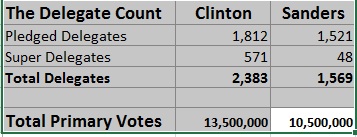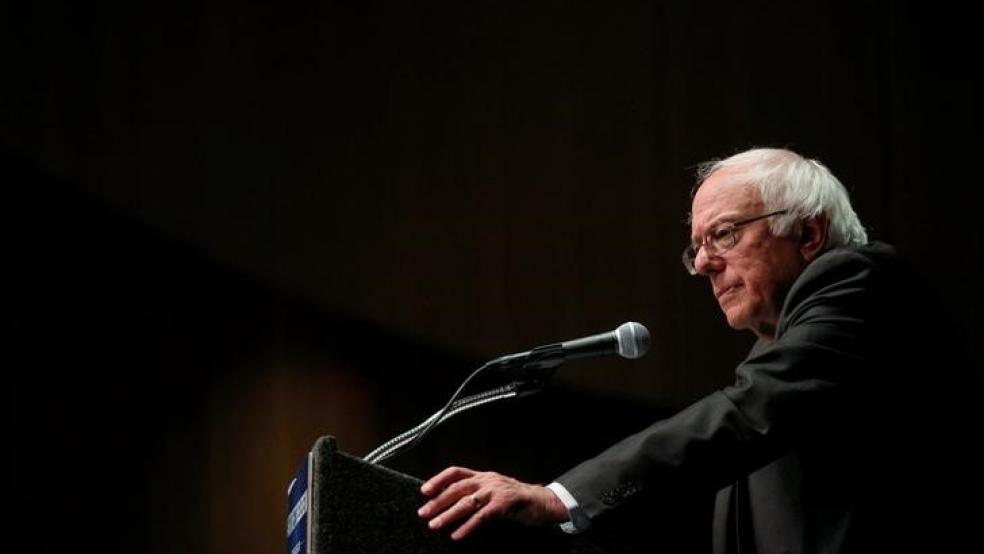Former secretary of state Hillary Clinton reached her historic bid for the Democratic presidential nomination Monday night when she breached the 2,382 delegate threshold required to claim the mantle.
But Clinton has refused to celebrate her achievement in becoming the first woman in U.S. history to claim a major party presidential nomination until the vote is counted late tonight in California, the biggest and most desirable prize in the long 2016 primary season. A victory there over her stubborn rival, Sen. Bernie Sanders of Vermont, might finally drive a stake through the heart of Sanders candidacy and pave the way for a reconciliation process vital to the Democrats’ prospects of defeating presumptive GOP presidential nominee Donald Trump this fall.
Related: Clinton Clinches Democratic Nomination: AP Delegate Count
Winning California – combined with solid performances in New Jersey, South Dakota, North Dakota, New Mexico and Montana -- not only would substantially pad her delegate haul heading into the July national convention in Philadelphia, but would assure that she would have a majority of the pledged delegates, let alone the preponderance of non-elected superdelegates made up of elected government officials, party leaders and donors.
According to the unofficial tally, Clinton has 2,383 total delegates heading into today’s voting, including 1,812 pledged delegates and 571 superdelegates. Sanders has just 1,569 total votes, including 1,521 pledged and 48 superdelegates. Equally important, Clinton has garnered about three million more votes than Sanders throughout the country – 13.5 million to 10.5 million.
“So by almost every measure ... Hillary Clinton is very clearly the nominee,” Brian Fallon, Clinton’s campaign spokesperson, told MSNBC on Tuesday. “It is the will of the Democratic party that she be the nominee going forward. Sen. Sanders, I think, will submit to that reality.”
Yet the Clinton campaign’s hopes of closing the book on the surprisingly long and highly contentious Democratic primary contest may be wishful thinking. Sanders, the democratic socialist who came from practically nowhere to nearly sidetrack Clinton’s drive for the White House, insists he will take his case all the way to the convention floor in July.
Related: Some Democrats Pray for Clinton’s Indictment as Sanders Pushes On
Angry and frustrated that he has fallen well short of the nomination, Sanders and his advisers largely blame Democratic party leaders for stacking the rules and campaign schedule in Clinton’s favor, and blame a skeptical news media for negative coverage throughout his remarkable rise.
“It is unfortunate that the media, in a rush to judgement, are ignoring the Democratic National Committee’s clear statement that it would be wrong to count the votes of super delegates before they actually vote at the convention this summer,” Michael Briggs, Sanders’s chief spokesman, said in a statement issued Monday night from San Francisco. “Secretary Clinton does not have and will not have the requisite number of pledged delegates to secure the nomination. She will be dependent on super delegates who do not vote until July 25 and who can change their minds between now and then.”
A loss tonight in California would break the back of the already reeling Sanders campaign. Clinton could claim that despite her high negative ratings and the continuing controversy over her mishandling of emails at the State Department, the wind is now at her back and that she can unify the moderate and liberal wings of her party in time to beat Trump this fall.
However, a Sanders victory in the Golden State – even by a narrow margin of one or two percentage points, as the latest statewide polling suggests – would be a huge shot of adrenalin for the campaign and assure that the 74-year-old veteran lawmaker will continue nipping at Clinton’s heels for the next month and a half.
Related: 7 Ways Bernie Sanders Transformed the 2016 Election
Sanders once dismissed the superdelegates as a reflection of the Democratic political establishment he was running against. However, now that he has been beaten by Clinton in the race for pledged delegates chosen in primary election and caucuses, his only hope is to convince 70 percent or more of 571 superdelegates to switch their allegiance from Clinton to Sanders before mid-July.
Sanders’s task – which many political observers have dismissed as basically impossible -- is to take the national convention by storm this summer by wresting control of the drafting of the platform and then persuading hundreds of superdelegates that Sanders would make a stronger candidate against Trump than Clinton.
In order to do that, however, he would have to denigrate Clinton’s public record and voter drawing power just as the rest of the party would be attempting to reconcile differences and unite the party in preparation for the bruising battle ahead.
Just today, House Democratic Leaders Nancy Pelosi of California formally endorsed Clinton for president, while the White House has signaled that President Obama might officially endorse Clinton by the end of the week. White House advisers told The New York Times that Obama sees a Democratic successor as critical to his legacy and that he is impatient to begin campaigning.
Related: We Now Know Hillary Lied Multiple Times About Her Email Server
Sanders has been hailed for leading a political revolution that has energized the support of millions of young people and liberal activists, and there is a good chance he will heavily influence the party’s future policy directions on domestic and foreign policy issues. But if he insists on continuing to wage war against Clinton with no realistic prospects for gaining the nomination, he could risk becoming an outcast blamed for undermining the Democrats’ prospects for retaining control of the White House.
“One of the things that happens when you go through a process like this – and especially if you start out believing you’re not going to have much chance winning a nomination but it’s all about pulling the party in your direction – and all of a sudden the money is pouring in and the crowds are rapturous and you win some contest -- it changes your way of thinking,” said Norman Ornstein, a political expert with the American Enterprise Institute.
“And stepping back from that and conceding defeat is a very tough thing to do,” Ornstein said. “And at the same time, you’ve got a lot of people whispering in your ear – including a lot of those who make money as long as you stay in the race –saying, ‘stay there, stay the course, keep going.’ There may be at least a part of them saying, you know, if you keep going, maybe she will self-destruct. Maybe all of these email stories may result in an indictment. And if you’re still in the race, then they have no choice but to go to you for the nomination.”
The Vermont senator has yet to “flip” a single superdelegate, campaign manager Jeff Weaver conceded today in an interview with MSNBC. “But the intensity of our outreach to superdelegates will increase once all the voting is done,” including a final primary next week in Washington, D.C.
During a news conference Monday in Emeryville, California, Sanders refused to say whether he would consider endorsing Clinton before the convention if he doesn’t win in California tonight. “You’re asking me to speculate,” he said. “Let me talk to you after the primary in California. Let’s assess where we are after tomorrow before we make statements based on speculation.”
But feelings are running high between Sanders and Clinton partisans, and some Democrats have begun to accuse Sanders of a double standard, in having endorsed Obama in 2008 after wrapping up the nomination with a combination of pledged and superdelegates, yet trying to hold Clinton to a higher standard.
“Sen. Sanders declared president Obama the winner by that standard,” Fallon said. “So it’s a little strange he would use a different standard today. And after tonight it will be hard to argue with the results.”





